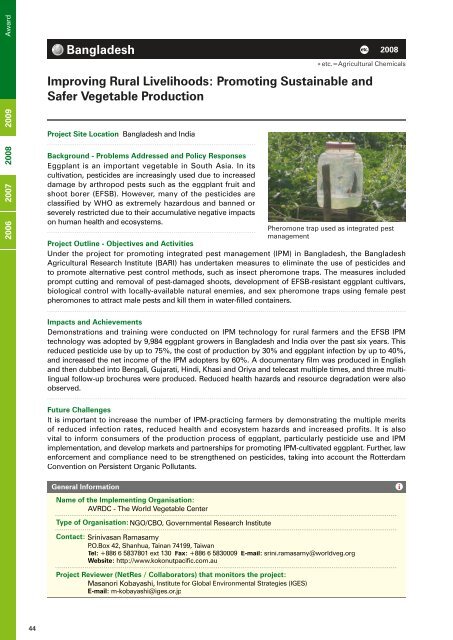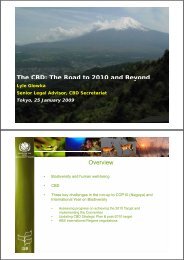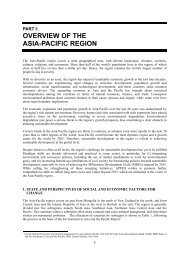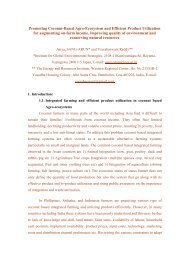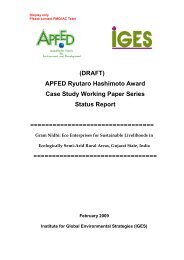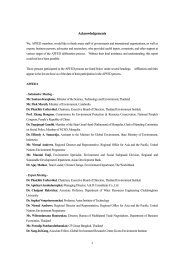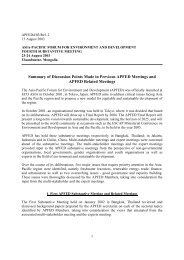APFED Booklet on Good Practices and Innovative Activities 2005 ...
APFED Booklet on Good Practices and Innovative Activities 2005 ...
APFED Booklet on Good Practices and Innovative Activities 2005 ...
Create successful ePaper yourself
Turn your PDF publications into a flip-book with our unique Google optimized e-Paper software.
Award<br />
Bangladesh<br />
etc.<br />
2008<br />
*etc.=Agricultural Chemicals<br />
Improving Rural Livelihoods: Promoting Sustainable <strong>and</strong><br />
Safer Vegetable Producti<strong>on</strong><br />
2009<br />
2006 2007 2008<br />
Project Site Locati<strong>on</strong> Bangladesh <strong>and</strong> India<br />
Background - Problems Addressed <strong>and</strong> Policy Resp<strong>on</strong>ses<br />
Eggplant is an important vegetable in South Asia. In its<br />
cultivati<strong>on</strong>, pesticides are increasingly used due to increased<br />
damage by arthropod pests such as the eggplant fruit <strong>and</strong><br />
shoot borer (EFSB). However, many of the pesticides are<br />
classified by WHO as extremely hazardous <strong>and</strong> banned or<br />
severely restricted due to their accumulative negative impacts<br />
<strong>on</strong> human health <strong>and</strong> ecosystems.<br />
Pherom<strong>on</strong>e trap used as integrated pest<br />
management<br />
Project Outline - Objectives <strong>and</strong> <strong>Activities</strong><br />
Under the project for promoting integrated pest management (IPM) in Bangladesh, the Bangladesh<br />
Agricultural Research Institute (BARI) has undertaken measures to eliminate the use of pesticides <strong>and</strong><br />
to promote alternative pest c<strong>on</strong>trol methods, such as insect pherom<strong>on</strong>e traps. The measures included<br />
prompt cutting <strong>and</strong> removal of pest-damaged shoots, development of EFSB-resistant eggplant cultivars,<br />
biological c<strong>on</strong>trol with locally-available natural enemies, <strong>and</strong> sex pherom<strong>on</strong>e traps using female pest<br />
pherom<strong>on</strong>es to attract male pests <strong>and</strong> kill them in water-filled c<strong>on</strong>tainers.<br />
Impacts <strong>and</strong> Achievements<br />
Dem<strong>on</strong>strati<strong>on</strong>s <strong>and</strong> training were c<strong>on</strong>ducted <strong>on</strong> IPM technology for rural farmers <strong>and</strong> the EFSB IPM<br />
technology was adopted by 9,984 eggplant growers in Bangladesh <strong>and</strong> India over the past six years. This<br />
reduced pesticide use by up to 75%, the cost of producti<strong>on</strong> by 30% <strong>and</strong> eggplant infecti<strong>on</strong> by up to 40%,<br />
<strong>and</strong> increased the net income of the IPM adopters by 60%. A documentary film was produced in English<br />
<strong>and</strong> then dubbed into Bengali, Gujarati, Hindi, Khasi <strong>and</strong> Oriya <strong>and</strong> telecast multiple times, <strong>and</strong> three multilingual<br />
follow-up brochures were produced. Reduced health hazards <strong>and</strong> resource degradati<strong>on</strong> were also<br />
observed.<br />
Future Challenges<br />
It is important to increase the number of IPM-practicing farmers by dem<strong>on</strong>strating the multiple merits<br />
of reduced infecti<strong>on</strong> rates, reduced health <strong>and</strong> ecosystem hazards <strong>and</strong> increased profits. It is also<br />
vital to inform c<strong>on</strong>sumers of the producti<strong>on</strong> process of eggplant, particularly pesticide use <strong>and</strong> IPM<br />
implementati<strong>on</strong>, <strong>and</strong> develop markets <strong>and</strong> partnerships for promoting IPM-cultivated eggplant. Further, law<br />
enforcement <strong>and</strong> compliance need to be strengthened <strong>on</strong> pesticides, taking into account the Rotterdam<br />
C<strong>on</strong>venti<strong>on</strong> <strong>on</strong> Persistent Organic Pollutants.<br />
General Informati<strong>on</strong><br />
Name of the Implementing Organisati<strong>on</strong>:<br />
AVRDC - The World Vegetable Center<br />
Type of Organisati<strong>on</strong>: NGO/CBO, Governmental Research Institute<br />
C<strong>on</strong>tact: Srinivasan Ramasamy<br />
P.O.Box 42, Shanhua, Tainan 74199, Taiwan<br />
Tel: +886 6 5837801 ext 130 Fax: +886 6 5830009 E-mail: srini.ramasamy@worldveg.org<br />
Website: http://www.kok<strong>on</strong>utpacific.com.au<br />
Project Reviewer (NetRes / Collaborators) that m<strong>on</strong>itors the project:<br />
Masanori Kobayashi, Institute for Global Envir<strong>on</strong>mental Strategies (IGES)<br />
E-mail: m-kobayashi@iges.or.jp<br />
44


